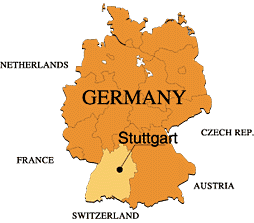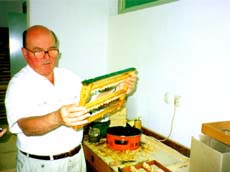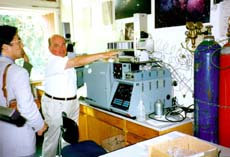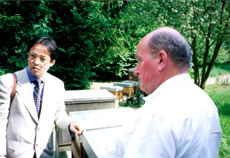 |
| Bee Square HOME | The Miraculous Life of Bees | A Surprising Story about Bees | Look into a honeycomb! | An Introduction to Beekeeping |
| Honeybee Restaurant | Beekeeping Reports from Around the World | Fairy Tales and Picture Books about Bees Story Collection | News From the Bee Farm | Links |
|
|
[Apiculture Reports from around the World] Germany My Encounter with the "Honey Standard" in a Developed Apiculture Country, Germany. |

|
Visiting the "God of Apiculture."
|
|
Retaining the Original Ingredients of the Blessings of Nature. Next, Mr. Vorwohl explained to us about the standards for HMF. HMF is hydroxymethyl furfural that is generated when honey is heated. By measuring the HMF contents in the honey, it is possible to check if the honey is overheated or not. Prevention of overheating is indispensable for honey production in order to avoid destroying nutrients, such as enzymes, contained in honey. The Yamada Bee Farm maintains the traditional production method of keeping the temperature lower than 45 degrees centigrade. However, popular production processes taken by other major honey makers in Japan and the United States heat honey to over 60 degrees centigrade and process it in a decompression caldron. Mr. Vorwohl gave us an explanation on this method of using a decompression caldron. |
|
"Forest Honey" and "Heather Honey."
|
Yamada Bee Farm (Kagaminocho Pref. Okayama)
Copyright(C)2005 Yamada Bee Farm All Rights Reserved.
|


 Stuttgart is the capital of Baden Wurttemberg, a southeastern region of Germany. Our journey in Germany, a land of honey standards, started from Stuttgart, the northern base of the Black Forest.
Stuttgart is the capital of Baden Wurttemberg, a southeastern region of Germany. Our journey in Germany, a land of honey standards, started from Stuttgart, the northern base of the Black Forest. "That production method is not allowed in Germany. When the pressure is lowered by decompression equipment, the original aroma of honey is also lost. In Provision 3 of Article 2 of the "Honey Purification Act," it is stipulated that 'Any original ingredients of natural honey shall not be lost in the process of purification.' Therefore, the loss of the original aroma of honey is against this regulation."
"That production method is not allowed in Germany. When the pressure is lowered by decompression equipment, the original aroma of honey is also lost. In Provision 3 of Article 2 of the "Honey Purification Act," it is stipulated that 'Any original ingredients of natural honey shall not be lost in the process of purification.' Therefore, the loss of the original aroma of honey is against this regulation." Mr. Vorwohl told me a very interesting story about honey. In Germany, there is honey called "Forest Honey" or "Tree Honey." Trees are making sugar to live, and insects are eating it by digging holes in the trees. "Forest Honey" is taken from the sugar made in the woods. Especially in southwestern Germany, where the Black Forest is situated, "Forest Honey" is very popular and valuable. It ranks as the top level in terms of quality. In northern Germany, "Heather Honey" is taken from Erica, a shrub whose red flowers bloom in autumn. This is also a very popular kind of honey.
Mr. Vorwohl told me a very interesting story about honey. In Germany, there is honey called "Forest Honey" or "Tree Honey." Trees are making sugar to live, and insects are eating it by digging holes in the trees. "Forest Honey" is taken from the sugar made in the woods. Especially in southwestern Germany, where the Black Forest is situated, "Forest Honey" is very popular and valuable. It ranks as the top level in terms of quality. In northern Germany, "Heather Honey" is taken from Erica, a shrub whose red flowers bloom in autumn. This is also a very popular kind of honey.